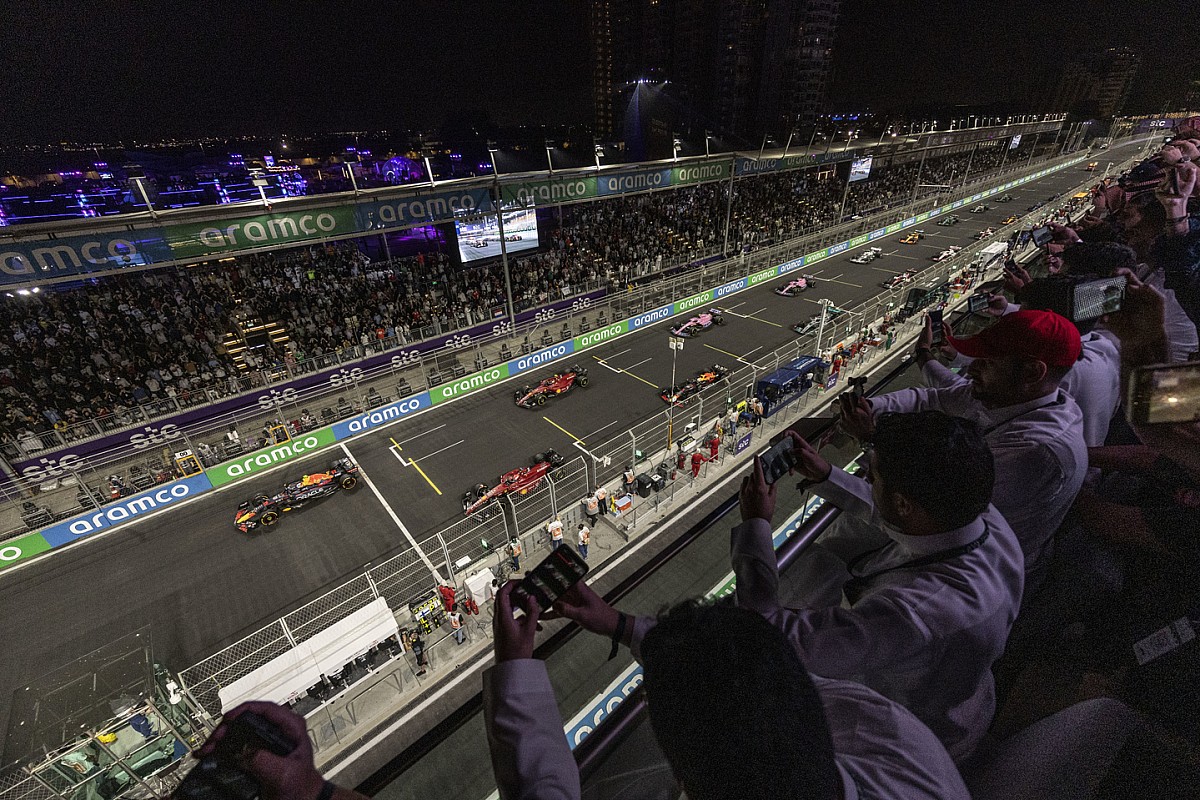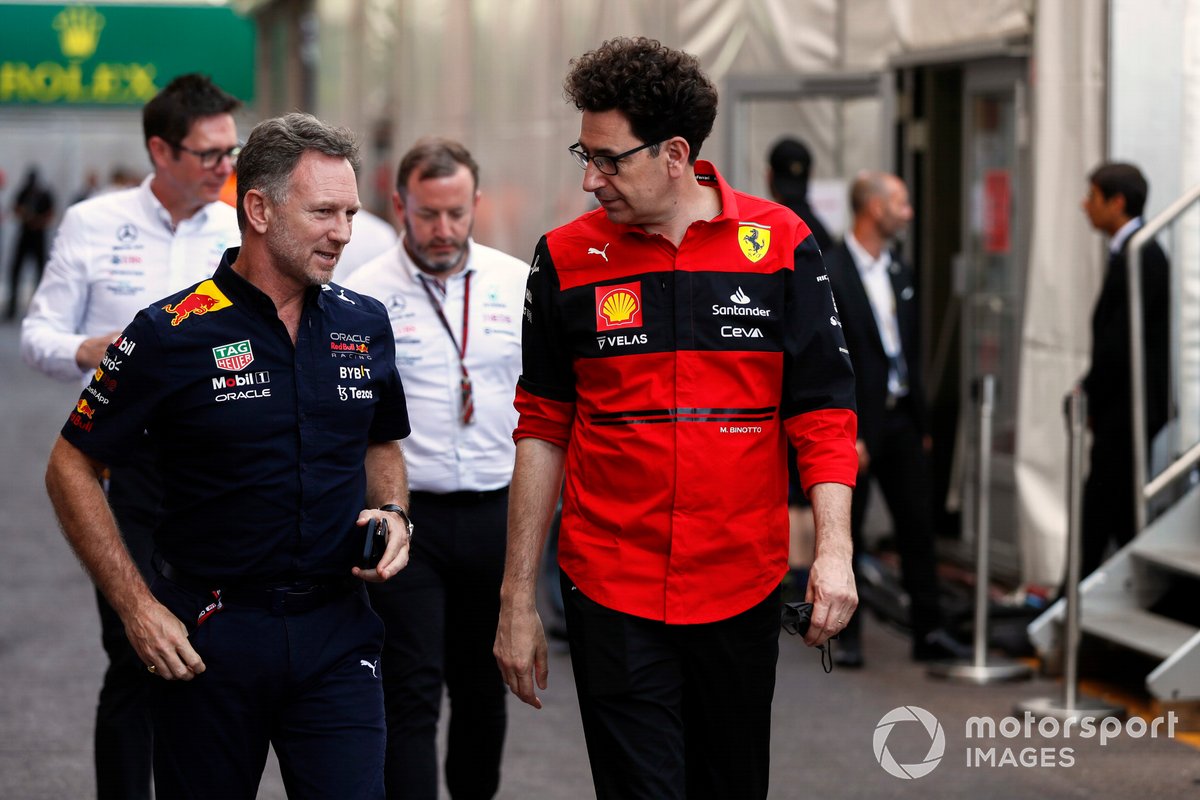
According to the FIA financial regulations, that is a potential outcome should a team breach the cost cap limit, as several expect to.
However, no one knows which penalties from a list of possible sanctions outlined in the rules are likely to be applied, given that there is no precedent.
Those rules contain a long list of breaches, mostly related to teams not reporting their spending accurately or on time, or attempting to pull the wool over the eyes of the Cost Cap Administration [CCA], the body responsible for monitoring adherence to them.
On Tuesday we heard about the first such offence, albeit a minor one, when Williams was fined $25,000 for not getting its 2021 paperwork filed by the deadline of 31st March.
However, the most important sections of the financial regulations relate to simple cases of spending more than the limit.
Such breaches will be referred to the Cost Cap Adjudication Panel [CCAP], which is a group of six to 12 judges proposed by the FIA and by the teams. Any decision they make can subsequently be challenged by the team concerned, or other parties, in the International Court of Appeal.
Overspending, whether in the numbers voluntarily declared by a team up front, or those discovered later via an investigation, falls into two categories.
There’s a simple split at 5% of the cap: a breach below that is regarded as a “minor overspend”, while anything above 5% is a “material overspend”. The latter case is taken far more seriously.
That 5% number is not insignificant. Teams are currently aiming for $140m plus $1.2m for the 22nd race, making for a 2022 total of $141.2m. Thus a 5% breach represents extra spending of around $7m – which equates to a huge amount of R&D, potentially enough to make the difference between winning or losing the title.

The rules note that in the event of an overspend below 5% the CCAP “may impose a financial penalty and/or any minor sporting penalties.”
The financial penalty is defined simply as “a fine in an amount to be determined on a case-by-case basis.” A fine could be seen as a slap on the wrist for an organisation that literally has more money than it can spend, but more concerning for the teams is the menu of minor sporting penalties, from which “one or more” can be selected.
The least painful sanction is a public reprimand, albeit one that a manufacturer-backed team like Mercedes would be a little embarrassed to receive.
More dramatic alternatives are the deduction of constructors' or drivers' championship points from the season concerned.
Then there is what is clumsily defined as “suspension from one or more stages of a competition or competitions, excluding for the avoidance of doubt the race itself” - which effectively means being forced to miss practice sessions.
There are also two penalties affecting future performance rather than the past season’s results – a reduction in the team’s own cost cap for the following year and “limitations on the ability to conduct aerodynamic or other testing”.
So what if a team goes over the limit by more than 5% and into the “material sporting penalty” zone?
In such a case one element of the sanction is clear – the CCAP “shall impose a constructors' championship points deduction”. Additionally it “may impose a financial penalty and/or any other material sporting penalties”.
All of the penalties outlined for a minor breach remain options, with the exception of the public reprimand.
However two further and heavier sanctions are added to the menu, namely “suspension from an entire competition or competitions, including for the avoidance of doubt the race itself,” and most dramatically, “exclusion from the championship.”

How a penalty is chosen by the CCAP from the range on offer for minor and major breaches remains to be seen, but the rules make it clear that the circumstances will play a part. In essence if you co-operate with the CCA and the FIA’s auditors, and are open and honest, you are potentially better off.
Aggravating factors include “any element of bad faith, dishonesty, wilful concealment or fraud,” “failure to co-operate,” a record of “multiple breaches” within the year or breaches in a previous year, and the “quantum of breach”.
On the other hand, mitigating factors are seen as “voluntary disclosure”, a “track record of compliance”, “full and unfettered co-operation”, and perhaps most significantly, “unforeseen force majeure events”.
Will teams be able to use global inflation, citing the role of the conflict in Ukraine as a key driver, as a case of force majeure?
Those who expect to breach the cap are certainly well aware of the relevance of the 5% cut-off, and its associated lesser penalties. However, they don’t know exactly how those penalties will be dished out, and thus even aiming to stay within that 5% is a bit of a gamble.
“In the regulations, there is a threshold, which is 5%,” says Ferrari boss Mattia Binotto. “If you do not exceed the 5%, on the top of what's the budget cap threshold, it will be considered a minor breach.
“And what's a minor breach in case of force majeure? What will the stewards and the FIA decide on that, in terms of penalties? No idea.
“But I don't think there is any way for us – and for many teams – simply to stay within.
“And even laying-off people, I don't think that's a good and right choice. It's already summertime. By the time you organise it, and you do it, the benefit it can have is not sufficient to cope with the excess of prices and costs we've got.”

Binotto is adamant that without an upwards tweak to balance inflation the regulations will be breached by multiple teams.
“What will be the implications?” said the Italian. “For me, the most important, is many teams will breach it. And that, I think, will be simply bad for the financial regulations.
“And we'll start debating if a financial regulation is worthwhile, is it working? And putting everything back in discussion. And I think that, again, to avoid that, because it's important to have a cap somehow, I think the only way is to take a breath, take some more time, and try to do a better and proper job for next year and the following one.”
Red Bull’s Christian Horner makes an intriguing point about how close some might try to get to the 5% threshold, in the typical F1 fashion of pushing the limits.
“I think certainly all the major teams are going to breach that 140 count this year,” he says. “As Mattia has pointed out, there's a 5% threshold for a minor breach. What is the penalty for a minor breach?
“And what we don't want to do is end up playing a game of chicken. As to say, does he go to 4.9% over? Do we go to 4.7% over? And that would be [worth] one upgrade that could be the differentiating factor of this world championship.”
The bosses of the top teams are being very vocal to the media about the likelihood of busting the cap, and they have been just as open in F1 Commission meetings and similar gatherings.
In effect they are not hiding anything and preparing the ground for multiple teams to breach the $141.2m limit, leaving the CCAP with the difficult job of doling out penalties when the final numbers are crunched post-season.

Will the CCAP’s members be more lenient with those who don’t push their overspend too far? And how will they deal with the fact that teams have known all year that they are going to overspend and planned for it when one of the basic rules is that they “must not have relevant costs in excess of the cost cap”?
The biggest question is will the CCAP be bold enough to make a post-season decision on a points deduction that impacts the outcome of the drivers' or constructors' championships? Remember these are judges who operate independently of the FIA, and carry no baggage.
Taking a title away from a driver would be a massive call to make – but one could argue that Olympians have lost gold medals months or years after their events once the results of drug tests worked their way through the system. It’s never too late to penalise cheats.
However such an outcome in F1, made long after the Abu Dhabi GP, will potentially make the fuss that followed last year’s tainted finale look positively tame by comparison. It would inevitably be followed by an appeal to the ICA that would drag on even further, while the CCAP can itself review its decisions if new evidence emerges within three months.
It’s worth noting too that the financial regulations operate with a five-year statute of limitations, in effect creating some leeway for a whistleblower who has subsequently left a team to report dodgy behaviour. In other words the CCAP could still go back and investigate the 2022 season in 2027…
Are the top teams simply gambling on the fact that if they all bust the cap but stay within the 5% threshold for a “minor” breach, they won’t face the harshest sanctions, those that impact the championship outcome? It certainly looks that way.








